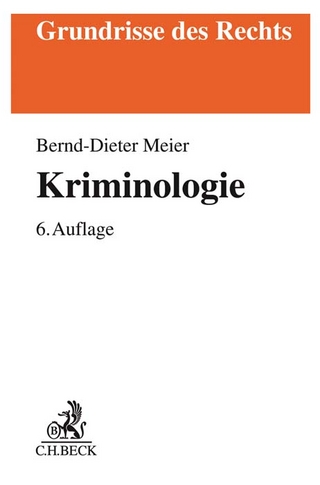
Corrections in the Community
Routledge (Verlag)
978-1-138-85417-8 (ISBN)
- Titel erscheint in neuer Auflage
- Artikel merken
This book provides students with a thorough understanding of the theoretical and practical aspects of community corrections and prepares them to evaluate and strengthen these crucial programs. This sixth edition includes a new chapter on specialty drug and other problem-solving courts. Now found in every state, these specialty courts represent a new way to deal with some of the problems that face our citizens, be it substance abuse or reentry to the community from prison. Chapters contain key terms, boxed material, review questions, and recommended readings, and a glossary is provided to clarify important concepts.
Edward J. Latessa is Professor and Director of the School of Criminal Justice at the University of Cincinnati. He received his Ph.D. from the Ohio State University in 1979. Dr. Latessa has published more than 140 works in the area of criminal justice, corrections, and juvenile justice. He is coauthor of seven books, including What Works (and Doesn’t) in Reducing Recidivism and Corrections in America. Dr. Latessa has directed over 150 funded research projects including studies of day reporting centers, juvenile justice programs, drug courts, prison programs, intensive supervision programs, halfway houses, and drug programs. He has been involved in evaluations of more than 600 correctional programs throughout the United States, and he has provided technical assistance and workshops in over forty-five states. Dr. Latessa is a member of the Office of Justice Programs Science Advisory Board subcommittee for the Bureau of Justice Assistance (appointed 2011) and has been a reviewer for the Office of Juvenile Justice and Delinquency Prevention Model Programs Guide. He is also a Senior Reviewer in the area of Corrections and Courts for the National Institute of Justice and the Office of Justice Programs. Dr. Latessa served as President of the Academy of Criminal Justice Sciences (1989-90). He has also received several awards, including: the Sylvia Boltz Tucker Award for Leadership and Service from the College of Education, Criminal Justice and Human Services, University of Cincinnati (2014); co-recipient of the MacNamara Award for best published paper from the Academy of Criminal Justice Sciences (2014); the Marguerite Q. Warren and Ted B. Palmer Differential Intervention Award presented from the Division of Corrections and Sentencing of the American Society of Criminology (2010); the Outstanding Community Partner Award from the Arizona Department of Juvenile Corrections (2010); the Maud Booth Correctional Services Award in recognition of dedicated service and leadership presented by the Volunteers of America (2010); the Community Hero Award presented by Community Resources for Justice (2010); the Bruce Smith Award for outstanding contributions to criminal justice from the Academy of Criminal Justice Sciences (2010); the George Beto Scholar Award from the College of Criminal Justice, Sam Houston State University (2009); the Mark Hatfield Award for Contributions in public policy research from The Hatfield School of Government at Portland State University (2008); the Outstanding Achievement Award from the National Juvenile Justice Court Services Association (2007); the August Vollmer Award from the American Society of Criminology (2004); the Simon Dinitz Criminal Justice Research Award from the Ohio Department of Rehabilitation and Correction (2002); the Margaret Mead Award for dedicated service to the causes of social justice and humanitarian advancement from the International Community Corrections Association (2001); the Peter P. Lejins Award for Research from the American Correctional Association (1999); the ACJS Fellow Award (1998); and the ACJS Founders Award (1992). In 2013 he was identified as one of the most innovative people in criminal justice by a national survey conducted by the Center for Court Innovation in partnership with the Bureau of Justice Assistance and the U.S. Department of Justice. Paula Smith is an Associate Professor in the School of Criminal Justice at the University of Cincinnati. She received her Ph.D. in psychology from the University of New Brunswick in 2006. Her research interests include offender classification and assessment, correctional rehabilitation, the psychological effects of incarceration, program implementation and evaluation, the transfer of knowledge to practitioners and policy makers, and meta-analysis. She has authored more than 60 articles, book chapters, and conference presentations on the aforementioned topics. Dr. Smith has directed numerous research projects and has been involved in evaluations of more than 400 correctional programs throughout the United States. She is a member of the Accreditation Panel for the National Offender Management Service in the UK as well as the Global Consortium on Corrections Research with Griffith University in Australia. In addition to her research experience, Dr. Smith has considerable frontline experience working with a variety of offender populations, including juvenile offenders, sex offenders, and perpetrators of domestic violence. Currently, she provides technical assistance to criminal justice agencies throughout the United States and Canada.
1. The Criminal Justice System 2. Sentencing and Community Corrections 3. Probation in America 4. Parole in America 5. What Works in Probation and Parole 6. Juveniles and Community Corrections 7. Roles of Probation and Parole Officers 8. Offender Assessment 9. Strategies for Managing and Providing Services to Offenders 10. Intermediate Sanctions 11. Community Residential Correctional Programs 12. Special Populations in Community Corrections 13. Drug and Other Problem-Solving Courts 14. Evaluating Community Corrections 15. The Future of Corrections in the Community
| Zusatzinfo | 83 Line drawings, color; 6 Halftones, black and white; 49 Tables, color; 83 Illustrations, color; 6 Illustrations, black and white |
|---|---|
| Verlagsort | London |
| Sprache | englisch |
| Maße | 187 x 235 mm |
| Gewicht | 1176 g |
| Themenwelt | Recht / Steuern ► Strafrecht ► Kriminologie |
| ISBN-10 | 1-138-85417-4 / 1138854174 |
| ISBN-13 | 978-1-138-85417-8 / 9781138854178 |
| Zustand | Neuware |
| Haben Sie eine Frage zum Produkt? |
aus dem Bereich



